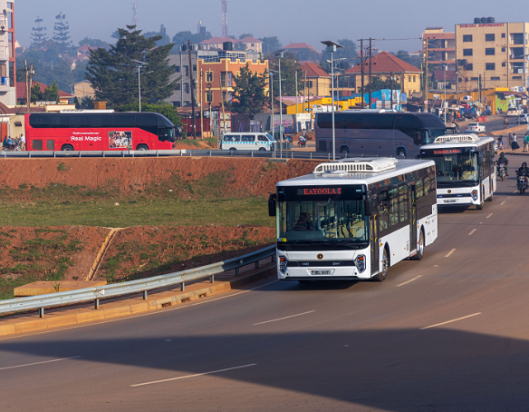Operators of Uganda’s first-ever passenger electric vehicle, Kayoola EV, are registering a high number of passengers.
Kayoola the 90-passenger capacity bus is manufactured in Uganda by Kiira Motors Corporation. Two of these, have been offering passenger services at the Northern Bypass.
On Monday, Kalita transporters deployed two Kira motors Kayoola buses, to ply the Bweyogerere Busega route through the northern Bypass.
Godfrey Kasaijja, the Manager of the Kayoola Transport Company says that when they started their operations on Monday, the number of passengers was 30, but in the subsequent days, it increased to 70-90 passengers per trip.
According to the increasing number of passengers is a positive development.
On Sunday, Monica Musenero, the Minister of Science and Technology highlighted that the country is focusing on electrifying the public transport sector in the capital.
Following the hike in the prices of petroleum worldwide, President Yoweri Museveni has been pushing for electric vehicles as the only solution to the fuel crisis, saying the government will invest in any private venture into the business.
Uganda is estimated to spend up to 2 billion dollars every year on fossil fuel vehicle spare parts, and a big percentage of this can be saved as e-mobility is popularized.
The Kayoola has been hired by corporations to transport their staff to and from work, which the minister says was a perfect preliminary test for these vehicles.
Kiira Motors Corporation has so far produced 6 units as well as electric salon cars branded “Kiira EV”, and one low emission EURO 4 long-distance vessel, currently deployed by Kalita Transport Company plying Kampala-Bwera.
The Ugandan-made all-electric powered 90-passenger capacity Bus vessel, with 41 seats, and 49 stand handles, with the capacity to run for 300 km after a single charge, and a spacious interior for a comfortable trip.
Paul Isaac Musaasizi the Chief Executive Officer of Kiira Motors Corporation, in an interview, told URN that the country is now moving at a good pace toward e-mobility, though the corporation needs some incentives from the government for effective operations.
According to Musaasizi, the laws and the regulations in the country should also be streamlined sooner than later, to enable them to accommodate the plight of electric vehicles, and he is very optimistic that the inter-ministerial committee is working on this swiftly well.
Two weeks ago the government formed an inter-ministerial task force co-chaired by the Ministry of Works and that of Energy, whose primary objective is to expedite the country’s goal of having at least 25 percent of the cars on roads to be electric by 2030.
Some passengers could not hide their excitement about traveling in the electric bus.
Alexandria Meeme, says the reduced transport fare and the silence of the engine stood out.
Caroline Kirabo, says that she was happy that there was a first aid box, cameras, and different phone charging points on the bus seats.
Among the other features, the bus has in-built air conditioners, two emergency exists, and a hand-held automatic sound hammer for glass breaking that can be used in emergencies.
-URN





